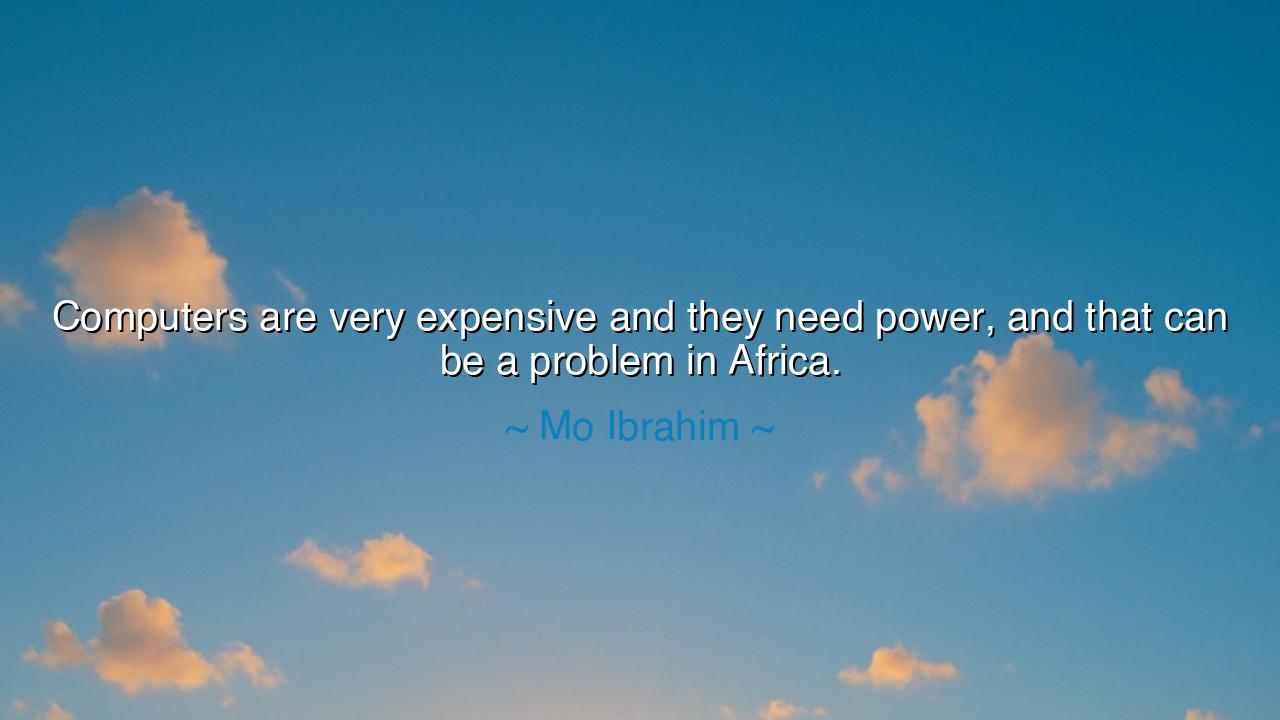
Computers are very expensive and they need power, and that can be






In the vast and sunlit lands of the African continent, where the rhythm of life beats to the pulse of both ancient tradition and modern hope, Mo Ibrahim, a man of vision and wisdom, once spoke with simple truth: “Computers are very expensive and they need power, and that can be a problem in Africa.” His words, though humble in sound, echo with profound insight. For they speak not merely of machines and electricity, but of the eternal struggle between progress and access, between the dreams of the modern age and the realities that still bind many corners of the world.
In the ancient sense, Ibrahim’s words are not a complaint, but a lament and a warning. They remind us that technology, though a gift of intellect and invention, remains a fragile servant—one dependent on the foundations of civilization: infrastructure, education, and justice. The computer, symbol of humanity’s digital triumph, is of little use in a village without light, where children study by candle and the hum of machines is replaced by the whisper of wind. Thus, Ibrahim speaks as a guardian of perspective, reminding those who celebrate innovation that true progress must reach beyond the towers of wealth and into the hands of all.
The story of Africa is not one of absence, but of potential. Like the Nile that waits each year for its flood to nourish the soil, the continent waits for the current of energy to awaken its full strength. Once, the great libraries of Timbuktu were the centers of learning for the world, where scholars from far lands came to read, study, and exchange ideas. Africa has always held the flame of intellect. Yet now, in the age of computers and global connectivity, the challenge is not the absence of wisdom, but the lack of power—both electrical and political—to sustain the tools that carry knowledge across the world.
Consider the tale of William Kamkwamba, a young man from Malawi, who, though born into poverty, refused to surrender to limitation. With his own hands, he built a windmill from discarded parts to bring electricity to his village. He understood, as Ibrahim does, that the obstacle is not intelligence, but access. William’s creation became a beacon—proof that even in the poorest corners of the earth, innovation can bloom if given the breath of opportunity. But imagine what millions of young minds could achieve if the barriers Ibrahim speaks of were broken: if every child had light, every school had computers, and every village could connect to the world’s knowledge.
There is wisdom in Ibrahim’s realism. The cost of progress is not measured in machines alone, but in the readiness of society to sustain them. To introduce computers without power is like planting seeds in barren ground; they cannot grow without nourishment. Thus, the solution lies not merely in generosity or technology, but in the building of foundations—the creation of stable systems that allow tools of the mind to flourish. For in the long arc of civilization, it is not the invention of machines that defines greatness, but the ability to make them serve all humanity.
And yet, his words are also hopeful, for they draw attention to what must be done. Every problem, when seen clearly, becomes a call to action. If power is lacking, then let us build it. If technology is costly, then let us make it affordable and shared. If knowledge is distant, then let us bring it closer. The spirit of progress is not born from despair, but from the recognition of need. Mo Ibrahim, himself a builder of networks and a champion of governance, understood that to lift a people, one must not only give them tools but also the means to use them.
So let this be the lesson carried forth: Technology is only as powerful as the justice that supports it. Innovation must not dwell in isolation; it must be shared as fire was once shared among tribes, warming every soul. The wise will see that the solution to inequality lies not in pity, but in partnership — in empowering communities to build, sustain, and own their progress.
Therefore, remember this truth: the computer and the power that feeds it are but symbols of a deeper challenge — to ensure that the light of knowledge shines for all, not just the privileged few. The future will not belong to the nations that have the most machines, but to those that use them to lift every human spirit. And in that vision, Mo Ibrahim’s words will stand as both a mirror and a guide — reminding us that true progress is not the spreading of technology alone, but the illumination of humanity itself.






AAdministratorAdministrator
Welcome, honored guests. Please leave a comment, we will respond soon